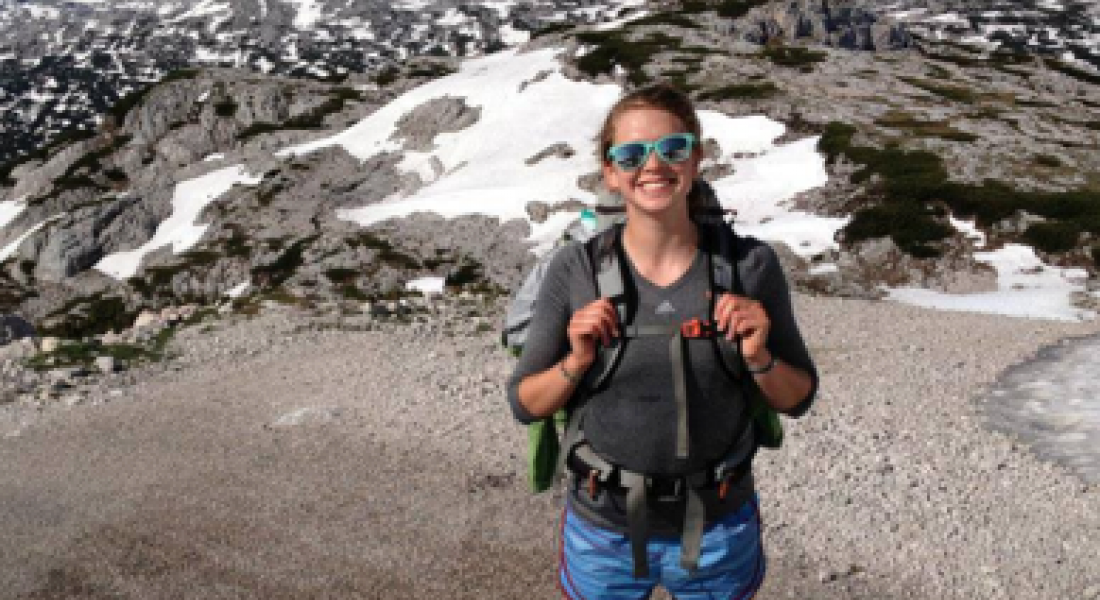
“I’m not perfect—far from it,” senior Anna Kottkamp smiled.
An environmental sciences major and International Development Studies (IDS) minor, Kottkamp was recently named valedictorian for the Class of 2015. She is the first to acknowledge that this academic honor is the result of many different experiences along her path.
“I was lucky to find something that I really, really love to study, and this has been crucial for my success,” she said.
Growing up in Wenatchee, Washington, Kottkamp was able to discover her passion for environmental science and foster this interest at Notre Dame. “I have grown up in a community that emphasizes nature and how it is all interconnected: human health is intertwined with the environment and the impact that we have on it.”
Throughout her undergraduate career, Kottkamp has studied the relationship between humans and the environment. To help her investigate this topic, Kottkamp won a Kellogg Experiencing the World Fellowship to conduct research on sustainable agriculture in Bolivia. Out of this experience, she wrote her IDS capstone essay, “Beneficiaries, Business Partners, and Brothers: A Case Study of Inclusive Business in the Bolivian Highlands.”
Initially, Kottkamp was drawn to Notre Dame for its international opportunities. She says the minor was an opportunity that stretched her academically and introduced her to topics she was unfamiliar with.
“I was exposed to such an interdisciplinary curriculum through Kellogg which fundamentally reshaped my perspectives on environmental science. I realized that I couldn’t just look at how water chemistry works in one part of a river, but how that water source impacts the people around it,” she said.
“One big conversation”
One of Kottkamp’s favorite classes was International Development in Practice, taught by Steve Reifenberg, associate professor of practice and executive director of the Kellogg Institute.
“The class forced me to ask a lot of questions and helped me to realize that there is rarely an easy answer. These lessons carried over into what I think more critically about environmental science,” she said. Reifenberg served as Kottkamp’s advisor to her capstone, and she acknowledged his overwhelming support, alongside other faculty, in helping her to succeed.
Another favorite class, taught by Professor of Biological Sciences David Lodge, brought together hard science and public policy.
“We discussed questions about: How does global fresh water apply to people? How do people make decisions around these issues? We covered topics from the drought in California to overtaxed water in Yemen,” Kottkamp said. The course was critical in helping her realize that science cannot be conducted in a vacuum without concern for the people who are a part of nature, too.
She also spoke about the special ability, and responsibility, that she feels Notre Dame has to foster this kind of dialogue and to promote different opinions on campus.
“I love the idea that Notre Dame is one big conversation where all perspectives can come together and inform each other: theology, philosophy, anthropology, but also hard sciences,” she said. “This helps everyone to engage on a whole other level.”
Beyond her activities around environmental conservation on campus, Kottkamp has also worked with the Monroe Park grocery store co-op in South Bend.
“South Bend is awesome, and I didn’t really realize that until I went off campus and met the people who are working so hard in the community to make a difference,” she said. Kottkamp appreciates this local involvement juxtaposed with her international education, because she believes people should be dedicated to the communities that are nearest to them, too.
Challenges new and old
After graduation, Kottkamp will return to the northwest through a position with the Jesuit Volunteer Corps at the Columbia Gorge Ecology Institute in Hood River, Oregon.
“The population in Hood River has a huge disparity. There are kids who have grown up kayaking and hiking on weekends, but there is also a huge migrant population,” she said. “The institute is intended to help kids understand and appreciate where they’re from so that they take pride in it.” Kottkamp will be traveling to schools throughout the area to teach a nine-week program around ecology which culminates in an outdoor field trip.
When reflecting back on her journey to this point, Kottkamp offered genuine insight into the challenges that led to her success.
“Freshman year was really hard and I had several transfer applications open at the time. I decided to stay, but I had to realize that I was here to learn and that it was okay to seek out help wherever I needed it,” she said. “As students, we like to look like we have everything together but it took me a long time to find and make friends. I was expecting everything to be instant, but it actually took time.”
Throughout, Kottkamp comes back to the support of the people around her. “I’ve been freed by my parents and people around me to do the things that I love. That has allowed me to think about the challenges and blessings presented to me as an opportunity and not as something just to get through,” she said. “While Kellogg has just been one piece of that, it has been instrumental.”





